This article needs additional citations for verification .(December 2009) (Learn how and when to remove this template message) |
Heavenly Discourse is a collection of satirical essays by Charles Erskine Scott Wood, published in 1927. [1]
This article needs additional citations for verification .(December 2009) (Learn how and when to remove this template message) |
Heavenly Discourse is a collection of satirical essays by Charles Erskine Scott Wood, published in 1927. [1]
Wood primarily wrote poetry and serious prose. [2] [3] However, Max Eastman and John Reed, co-editors of the radical magazine The Masses , [lower-alpha 1] asked him to write something humorous for their periodical. The result was a short satirical attack on World War I named The Heavenly Dialogue, published in 1914. This became the first of a series of similar dialogues. [4] Ten of these were published in The Masses . Following passage of the Espionage Act of 1917, The Masses was suppressed by the U. S. government on the grounds that it was detrimental to the war effort. Wood continued to write more discourses.[ citation needed ] After World War I, Max Eastman and others urged publication of the discourses in book form. [5] In 1927, the Vanguard Press published a collection of forty-one of them under the title Heavenly Discourse.[ citation needed ]
The work is primarily a dialogue between Satan and God about contemporary issues. They are presented as friendly adversaries who are often in general agreement. [1] God represents Wood's own perspective. [3] A variety of other characters also join the conversation, including angels, Jesus, Buddha, the Czar of Russia, Billy Sunday, Socrates, John Pierpont Morgan, Teddy Roosevelt, Carrie Nation, Sappho, François Rabelais, [1] Margaret Sanger, [3] and Mark Twain. [6]
Politically radical, the essays ridicule war, [7] prudishness, patriotism, bigotry [3] and Christian theology. [7] [8] Instead, they promoted bohemianism, free love, pacifism, socialism, [9] birth control, and women's rights [ specify ]. [8] The satire of these essays mocks mainstream society and views it with skepticism. [9] Titles of some of the discourses include Is God a Jew?,The United States Must Be Pure, and The Stupid Cannot Enter Heaven.[ citation needed ] Wood wrote Heavenly Discourse from the bourgeois radicalism of Greenwich Village of which he was a part. [8]
In one of the essays, Billy Sunday meets God, Wood pokes at bourgeois morality by imagining Billy Sunday in Heaven, surprised and disappointed to find people he condemned there. Jesus responds to his complaints, and points out that he associated with drinkers and prostitutes. [10]
Heavenly discourse is one of very few Western texts from this era to mention the angel Israfil of Arab folklore. [11]
Although Wood wrote extensively, this was his only work to reach a wide audience. [2] [3] The book had a substantial impact on Robert Paul Wolff [12] and Todd Gitlin. [9] Some American publications have called it a "classic". [5] [13] Kevin Starr wrote in 2002 that Heavenly Discourse now seems "pedestrian and heavy-handed" but affirms that it was daring in its time. [8]

Samael is an archangel in Talmudic and post-Talmudic lore; a figure who is the accuser (Ha-Satan), seducer, and destroyer (Mashhit).

Edwin Starr was an American singer and songwriter. Starr was famous for his Norman Whitfield-produced Motown singles of the 1970s, most notably the number-one hit "War".

The Southern Review is a quarterly literary magazine that was established by Robert Penn Warren in 1935 at the behest of Charles W. Pipkin and funded by Huey Long as a part of his investment in Louisiana State University. It publishes fiction, poetry, critical essays, and excerpts from novels in progress by established and emerging writers and includes reproductions of visual art. The Southern Review continues to follow Warren's articulation of the mission when he said that it gives "writers decent company between the covers, and [concentrates] editorial authority sufficiently for the journal to have its own distinctive character and quality".

The Monthly Review, established in 1949, is an independent socialist magazine published monthly in New York City. The publication is the longest continuously published socialist magazine in the United States.

Azrael is the Angel of Death in Islam and some Jewish traditions, and is referenced in Sikhism.
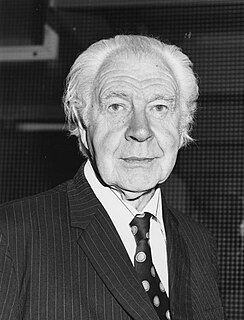
Lionel Charles Robbins, Baron Robbins, was a British economist, and prominent member of the economics department at the London School of Economics (LSE). He is known for his leadership at LSE, his proposed definition of economics, and for his instrumental efforts in shifting Anglo-Saxon economics from its Marshallian direction. He is famous for the quote, "Humans want what they can't have."

The living creatures, living beings, or hayyoth are a class of heavenly beings in Jewish mythology. They are described in the prophet Ezekiel's vision of the heavenly chariot in the first and tenth chapters of the Book of Ezekiel. References to the sacred creatures recur in texts of Second Temple Judaism, in rabbinical merkabah ("chariot") literature, in the Book of Revelation in the New Testament, and in the Zohar.

Charles Erskine Scott Wood or C.E.S. Wood was an American author, civil liberties advocate, artist, soldier, attorney, and Georgist. He is best known as the author of the 1927 satirical bestseller, Heavenly Discourse.

Israfil is the angel who blows into the trumpet to signal Qiyamah, sometimes depicted as the angel of music. Though unnamed in the Quran, he is one of the four Islamic archangels, along with Mikhail, Jibrail, and Azrael.

Morris Fishbein M.D. was an American physician and editor of the Journal of the American Medical Association (JAMA) from 1924 to 1950.
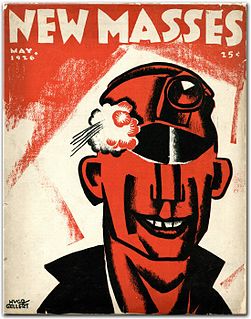
New Masses (1926–1948) was an American Marxist magazine closely associated with the Communist Party, USA. It succeeded both The Masses (1912–1917) and The Liberator. New Masses was later merged into Masses & Mainstream (1948–1963). With the coming of the Great Depression in 1929 America became more receptive to ideas from the political Left and New Masses became highly influential in intellectual circles. The magazine has been called “the principal organ of the American cultural left from 1926 onwards."

The Masses was a graphically innovative magazine of socialist politics published monthly in the United States from 1911 until 1917, when federal prosecutors brought charges against its editors for conspiring to obstruct conscription. It was succeeded by The Liberator and then later The New Masses. It published reportage, fiction, poetry and art by the leading radicals of the time such as Max Eastman, John Reed, Dorothy Day, and Floyd Dell.
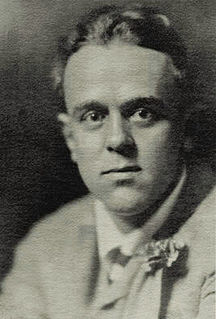
The John Reed Clubs (1929-1935), often referred to as John Reed Club or JRC, were an American federation of local organizations targeted towards Marxist writers, artists, and intellectuals, named after the American journalist and activist John Reed. Established in the fall of 1929, the John Reed Clubs were a mass organization of the Communist Party USA which sought to expand its influence among radical and liberal intellectuals. The organization was terminated in 1935.
Cornelia Baxter Barns was an American feminist, socialist, and political cartoonist.
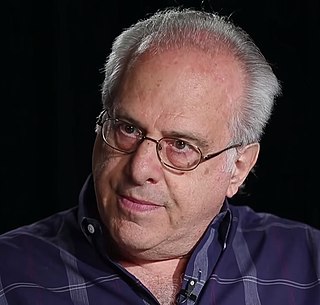
Richard David Wolff is an American Marxian economist, known for his work on economic methodology and class analysis. He is Professor Emeritus of Economics at the University of Massachusetts Amherst, and currently a Visiting Professor in the Graduate Program in International Affairs of the New School in New York. Wolff has also taught economics at Yale University, City University of New York, University of Utah, University of Paris I (Sorbonne), and The Brecht Forum in New York City.

The Vanguard Press (1926–1988) was a United States publishing house established with a $100,000 grant from the left wing American Fund for Public Service, better known as the Garland Fund. Throughout the 1920s, Vanguard Press issued an array of books on radical topics, including studies of the Soviet Union, socialist theory, and politically oriented fiction by a range of writers. The press ultimately received a total of $155,000 from the Garland Fund, which separated itself and turned the press over to its publisher, James Henle. Henle became sole owner in February 1932.
Events from the year 1749 in Ireland.
Post-Scarcity Anarchism is a collection of essays by Murray Bookchin, first published in 1971 by Ramparts Press. In it, Bookchin outlines the possible form anarchism might take under conditions of post-scarcity. One of Bookchin's major works, its author's radical thesis provoked controversy for being utopian in its faith in the liberatory potential of technology.
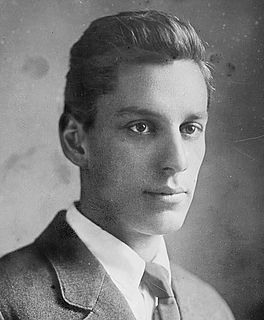
Max Forrester Eastman was an American writer on literature, philosophy and society, a poet and a prominent political activist. Moving to New York City for graduate school, Eastman became involved with radical circles in Greenwich Village. He supported socialism and became a leading patron of the Harlem Renaissance and an activist for a number of liberal and radical causes. For several years, he edited The Masses. With his sister Crystal Eastman, he co-founded in 1917 The Liberator, a radical magazine of politics and the arts.

Dianism is a 19th-century American spiritual sexual practice consisting of "sexual satisfaction from sexual contact" but without ejaculation. The practice was named for Diana, the Roman goddess of chastity, by American court reporter and astronomer Henry M. Parkhurst in his 1882 pamphlet Diana. In the 1890s, sexual mystic Ida Craddock included Dianism as part of her teachings. In the 20th century, the practice found favor with American followers of Aleister Crowley, most notably C.F. Russell.
Heavenly Discourse.
|title= (help)